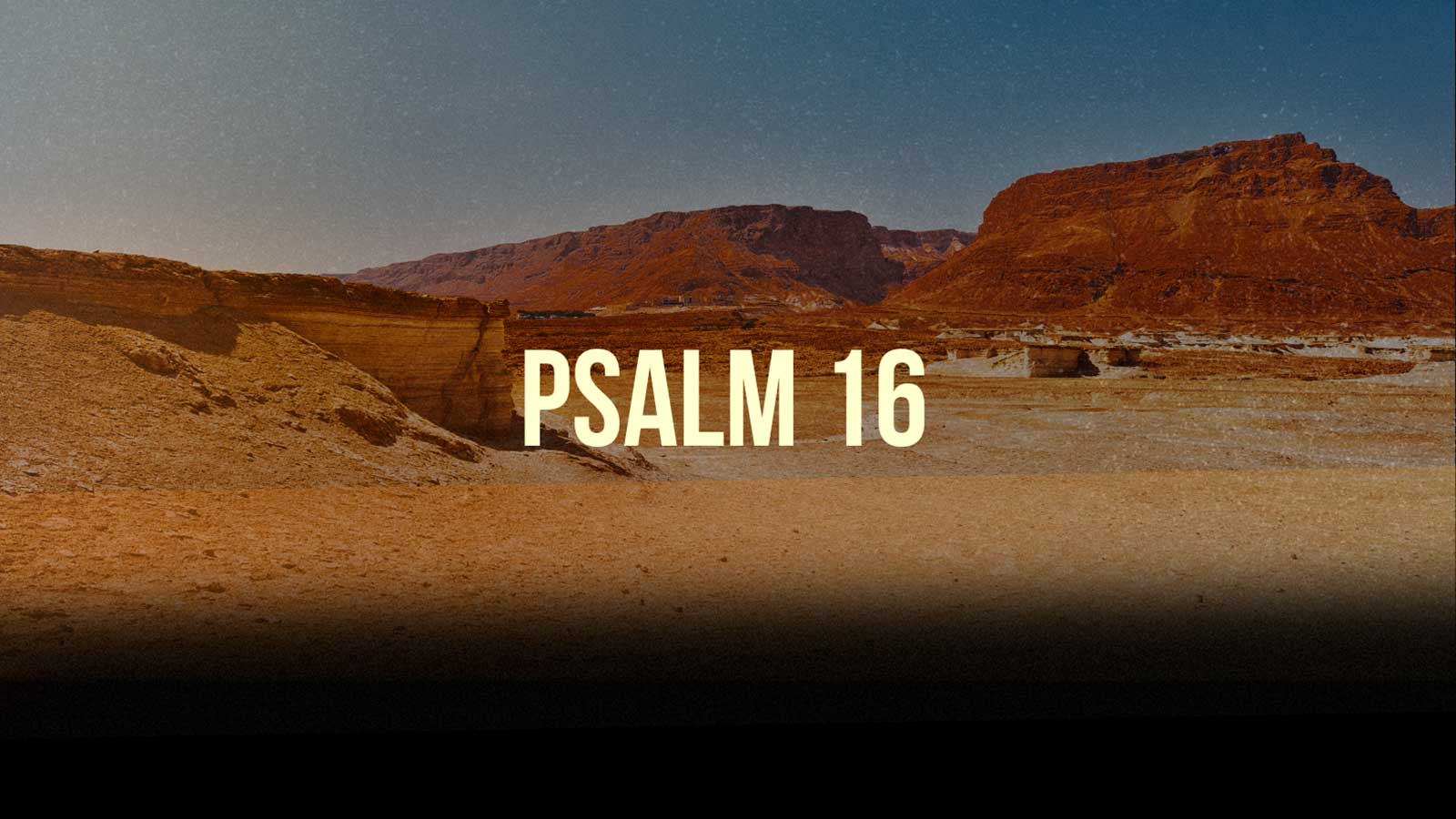The Psalm 16 is a true declaration of trust in divine protection and provision. Since ancient times, this psalm has been a source of comfort, inspiration, and spiritual reflection for those who wish to feel safe in God’s embrace. As we immerse ourselves in the content of Psalm 16, we realize that it is more than just a simple prayer—it is a testament of surrender and complete faith.
Complete Psalm 16
1 Keep me, O God, for I trust in You.
2 My soul said to the Lord: You are my Lord, my goodness does not reach Your presence,
3 but to the saints who are on the earth, and to the noble ones in whom is all my delight.
4 Pains will multiply for those who hurry to make offerings to another god; I will not offer their blood libations, nor will I take their names upon my lips.
5 The Lord is the portion of my inheritance and of my cup; You uphold my lot.
6 The lots have fallen for me in pleasant places: indeed, I have received a beautiful heritage.
7 I will praise the Lord who counseled me; even my innermost being instructs me at night.
8 I have set the Lord continually before me; because He is at my right hand, I shall not falter.
9 Therefore my heart is glad, and my glory rejoices; indeed, my flesh shall rest securely.
10 For You will not leave my soul in Hades, nor will You allow Your Holy One to see corruption.
11 You will make me see the path of life; in Your presence there is fullness of joy; at Your right hand there are pleasures forever.

The Authorship and Context of Psalm 16
Psalm 16 is attributed to David, king of Israel, and is known for his deeply emotional and spiritual psalms. This particular psalm is classified as a “Mictam”, a type of poetic composition whose exact definition is unknown, but which conveys a solemn and valuable message.
David wrote the Psalm 16 at a moment of complete surrender to God. He recognizes that aside from the Lord, there is no good, and he declares that his heart is secure even in the face of life’s uncertainties. It is a psalm that reinforces God’s sovereignty and the joy of being under His protection.
Verse-by-Verse Explanation of Psalm 16
Verse 1
“Keep me, O God, for I trust in You.”
David begins with a direct plea to God, asking for protection. He expresses complete trust in the Lord, demonstrating a faith that does not depend on circumstances but rather on an intimate relationship with the Creator. It is a short but powerful prayer that shows complete dependence on God.
Verse 2
“My soul said to the Lord: You are my Lord, my goodness does not reach Your presence,”
Here, David acknowledges the sovereignty of God over his life. He declares that the Lord is his true master and that no matter how good his actions may be, they are not sufficient to attain God’s holiness. It is a declaration of humility and reverence before the Most High.
Verse 3
“But to the saints who are on the earth, and to the noble ones in whom is all my delight.”
David shows appreciation for the righteous, calling them saints and noble ones. He states that he finds pleasure in being alongside people who fear God. This verse highlights the value of fellowship among those who follow the same path of faith and righteousness.
Verse 4
“Pains will multiply for those who hurry to make offerings to another god; I will not offer their blood libations, nor will I take their names upon my lips.”
At this point, David condemns idolatry. He states that those who follow other gods will experience pain and suffering. He completely rejects pagan rituals, such as blood libations, and even refuses to utter the names of these false deities. It is an expression of exclusive fidelity to the Lord.
Verse 5
“The Lord is the portion of my inheritance and of my cup; You uphold my lot.”
David uses symbolic language to affirm that his greatest wealth is God Himself. He sees the Lord as his inheritance, his spiritual nourishment, his everything. He also asserts that his life is secure because God is the one who upholds his destiny.
Verse 6
“The lots have fallen for me in pleasant places: indeed, I have received a beautiful heritage.”
This verse reinforces David’s gratitude for all that he has received. The “lots” refer to the division of lands, and he is saying that his portion has been blessed. However, the true inheritance he values is spiritual: the presence and favor of God.
Verse 7
“I will praise the Lord who counseled me; even my innermost being instructs me at night.”
David thanks God for being his counselor. He acknowledges that even in his innermost being, during the night, he is instructed by God. This reveals a deep relationship in which divine guidance is constant and touches every area of life.
Verse 8
“I have set the Lord continually before me; because He is at my right hand, I shall not falter.”
In this verse, David speaks of his daily spiritual practice: keeping the Lord constantly before him. This means living with an awareness of divine presence. Being at the “right hand” symbolizes protection and support. Therefore, he confidently asserts that he will not be shaken.
Verse 9
“Therefore my heart is glad, and my glory rejoices; indeed, my flesh shall rest securely.”
Trust in God produces joy and peace. David affirms that his soul is in celebration and his body can rest securely. This verse shows that true faith not only affects the spirit but also brings tranquility to the body and emotions.
Verse 10
“For You will not leave my soul in Hades, nor will You allow Your Holy One to see corruption.”
This is a prophetic verse that alludes to the resurrection. David declares his hope that God will not abandon him in death. The expression “Your Holy One” is also interpreted as a reference to Jesus, who rose and did not see decay in the tomb. It is a promise of eternal life for those who belong to God.
Verse 11
“You will make me see the path of life; in Your presence there is fullness of joy; at Your right hand there are pleasures forever.”
The psalm concludes with a glorious vision of life with God. David affirms that the Lord reveals the path of true life, and that in His presence there is abundant joy. The pleasures at God’s right hand are eternal. This verse closes the psalm with the promise of a full and happy existence alongside the Creator.

Reflections on Trust and Surrender
The central theme of Psalm 16 is trust. David acknowledges that everything he has and everything he is comes from God. This unconditional surrender is an invitation for each reader to reflect on their own relationship with the Creator.
Reading Psalm 16 invites us to exchange anxiety for peace, doubt for faith, and insecurity for the eternal refuge in God. It is a prayer for moments of distress, but also to strengthen the soul in times of peace.
The Application of Psalm 16 in Today’s World
Many people still turn to Psalm 16 as a means of seeking spiritual guidance. In the face of important decisions, losses, fears, or insecurities, this psalm serves as a reminder that there is a firm and secure refuge.
In a society that values instant gratification, Psalm 16 teaches us the value of waiting, trust, and the certainty that God is in control, even when everything seems uncertain.
Similar Terms and the Deep Meaning of Psalm 16
In addition to the direct expression Psalm 16, we can highlight related words and expressions that reinforce the spiritual message present in this biblical text. Among them, we highlight:
- Refuge in God
- Trust in the Lord
- Prayer of Surrender
- Joy in the Presence of God
- Unwavering Faith
These expressions are semantically related and broaden the understanding of the psalm. Each of them is connected to the central purpose of the passage: to trust in God above all things.
What Can We Learn from Psalm 16?
Among the teachings that Psalm 16 offers us, we can highlight:
The Importance of Recognizing God as Our Greatest Wealth
David makes it clear that no material possession can compare to the presence of God. This lesson is especially valuable in today’s world, where many place their value in fleeting things.
Genuine Joy Comes from the Presence of God
Verse 11 is clear in stating that in the presence of the Lord there is fullness of joy. This truth invites us to seek more of the divine presence than any other momentary pleasure.
God is Our Protector and Guide
Psalm 16 shows that the Lord is the one who upholds the righteous, guides their steps, and keeps them steady, even in difficult times.
Verses Similar to Psalm 16
The Bible is full of passages that resonate with Psalm 16, reinforcing its message of trust. Here are some examples:
- Psalm 23: “The Lord is my shepherd; I shall not want.”
- Psalm 91: “He who dwells in the shelter of the Most High will abide under the shadow of the Almighty.”
- Psalm 27: “The Lord is my light and my salvation; whom shall I fear?”
- Psalm 62: “In God alone, O my soul, wait in silence, for my hope comes from Him.”
Each of these passages complements and reinforces the message of Psalm 16, creating a network of teachings that uphold faith.
How to Pray Based on Psalm 16
Many people use Psalm 16 as a basis for their daily prayers. Below is an example of a prayer inspired by this psalm:
“Lord, keep me under Your wings, for I trust in You. You are all that I have and all that I need. Teach me to walk in Your ways and to live in the joy of Your presence. May my faith be steadfast and my hope always be in You. Amen.”
Praying based on Psalm 16 is a powerful way to align the heart with God’s will and seek refuge in His presence.
Why Memorize Psalm 16?
Memorizing verses from Psalm 16 can strengthen your faith in times of crisis. Knowing by heart phrases like “in Your presence there is fullness of joy” can be a balm for the soul when everything seems lost.
Moreover, memorization aids in the daily meditation on God’s Word and allows you to share comfort with others.
Curiosities about Psalm 16
- Psalm 16 is frequently quoted in the New Testament. Peter mentions it in Acts 2:25-28 in reference to the resurrection of Jesus.
- The expression “You will not allow Your Holy One to see corruption” is seen as a Messianic prophecy.
- This psalm is part of the readings in various religious traditions, being considered a text of great spiritual value.

FAQ: Frequently Asked Questions about Psalm 16
What does “You will make me see the paths of life” mean?
It means that God is the one who reveals the true meaning of existence and guides our steps so that we may have a full and purposeful life.
What is a “Mictam of David”?
“Mictam” is a Hebrew term that appears in some psalms and can mean “golden inscription” or “precious song”. It refers to psalms with special content.
How to Incorporate Psalm 16 into Your Routine?
You can start or end your day by reading Psalm 16, reflecting on its teachings, and applying its truths to your daily life.
Can Psalm 16 be used in moments of sorrow?
Yes. By speaking of refuge, guidance, and joy in the presence of God, Psalm 16 is ideal for moments when the soul is downcast.
What is the main message of Psalm 16?
The main message is that God is all we need. By trusting in Him, we find protection, joy, purpose, and true peace.
Conclusion
Psalm 16 is more than an ancient text—it is a living source of inspiration for those who seek trust and joy in God. Each verse invites reflection and strengthens the faith of those who find their true refuge in the Lord.
May the reading and meditation on Psalm 16 renew your hope, bring peace to your heart, and inspire a life closer to the Creator.
READ ALSO:
- Explanation of Psalm 121
- Study on Psalm 126
- What Is Psalm 124 For?
- Prayer of Saint Rita: A Source of Faith and Hope
- Promises of God: Strength and Hope
FOLLOW US ON FACEBOOK
Hope you enjoyed it
Leave your message of faith right below!